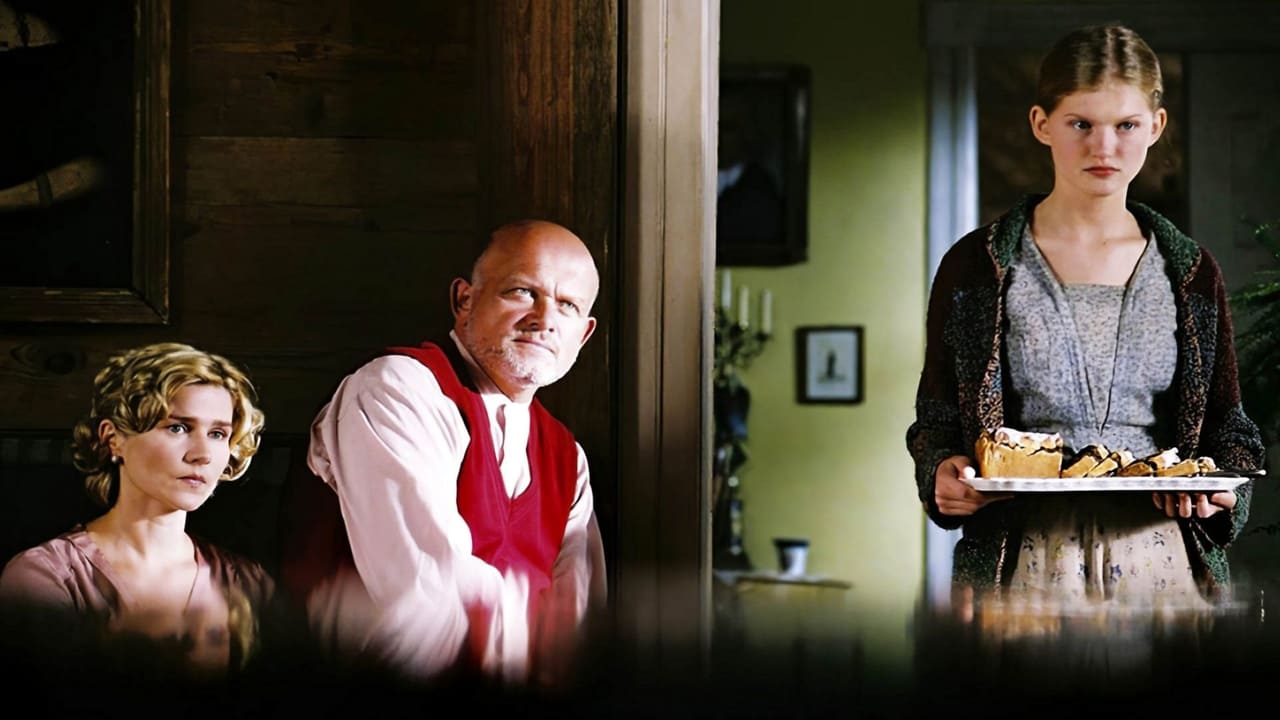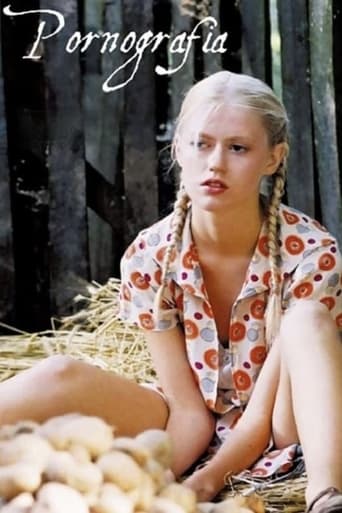

Excellent, a Must See
... View MoreA Brilliant Conflict
... View MoreA bit overrated, but still an amazing film
... View MoreIt really made me laugh, but for some moments I was tearing up because I could relate so much.
... View MoreThe movie begins slowly, insinuating itself into the lives of a handful of faceless Polish farmers, a study in pastoral torpor, towards the end of World War II. Well, I guess they're not all faceless. There are two fetching teen-aged girls who weave in and out of the picture in order to peel huge piles of potatoes and tempt the young men.The pace remains leisurely throughout, but it gradually draws us into the story of these characters. The principals remind me of a long layover I had at Union Station in Chicago. I wandered into a bar a few blocks away and the dozen customers all looked more or less like Fryderyk and Witold -- shabby, whiskery, a little dazed but quietly alert. The bartender was running numbers and one customer came in to play but shakily refused a drink, trying to escape his demons.Some of the customers were speaking Polish but I doubt they were saying anything like some of the lines that Fryderyk (Krzysztof Majchrzak) comes up with. He tells a woman why he plays that catchy tune on the piano -- happy, but sad too. There was a Pole once who was married to a Jew. The mother died and left the young girl behind. When the war came, she and her father were taken to the same camp but the father refused to recognize her. He'd "become an animal" after spending a week in the box car "with corpses and s***." In the film's last shot the camera slowly moves in on a snap shot of Fryderyk's daughter on his lap, and she's the most breathlessly beautiful and the happiest and the most heartbreakingly innocent creature you could imagine.There's a murder too. In fact, two murders. But the first we don't see at all, and the second only in confused silhouette. There are a couple of German soldiers who appear once or twice but they're jolly enough regular fellows, a little clumsy, good-natured, looking for eggs and no more. The photography is memorable.And yet the war is always somewhere in the background, the kind of indefinite threat that people don't pay attention to after a while. And in the end it leads to the murder of a collaborator who has revealed himself to Witold as a very human, very scared sort of monster, nobody's idea of a stereotype.There are two narrative threads, if we disregard the ones that lead nowhere. Some plot strands are just plain dead ends. (A farm boy commits the first murder for no apparent reason, is imprisoned in a bell tower, and then one of the girls sleeps with him. Why? Nobody knows.) But of the two major themes, one involves that flunky of the Germans, Colonal Siemien, whom we see only sweaty with fear and confusion. The other has to do with the affections of Henia, a succulent nymph who may or may not love the handsome, dumb, young Karol but who, in any case, is supposed to marry the self-effacing Waclaw, who is well-read and of higher social standing. Henia is no innocent adolescent though. She may be young -- she may look like a Polish LOLITA -- but she's slept around and continues to do so when she feels like it. By the end, Henia's conundrum seems like small Kartofellen."Pornography" means literally "writing about prostitutes." But if anybody is looking for soft-core porn in which Henia is subjected to gang bangs among the haystacks and in the barns, it's not here. The "pornography" of the title has nothing to do with sex. It has to do with something more dreadful than Henia or her inexperienced swains dream about.
... View MoreRecently my favorite video store acquired a DVD copy of this Polish language movie. The writer who wrote the book on which this film is based was recommended to me by a friend from Poland who had grown up in the post-war era, there, before being forcibly moved to live in Soviet Russia for a time. He said it was a memorable story for all thinking Poles, and might make a good film He may have been right about the book ( which I have not read ), but the film is a terrible disaster.The only analogy which seems to fit, for this commentary, is the idea that a truly fine chef has been hired to prepare a banquet for a large dinner party. For reasons unknown, despite having all the best food and all the best intentions, the result is a shambles of inedible or indigestible dishes. In other words, the result is a beautiful table laden with slop not fit for pigs.The setting is Poland during the occupation of World War II. The characters are upper middle-class Poles, brilliant and artistic people who have managed to survive the first years of the war and are now living ... well ... despite the occupation. After a few scenes which should have established the authenticity of these characters, in their home city, the scenario moves to a country estate in a farming area.All of the elements of a great movie are present: a genial host who owns the estate and farm, his beautiful and alcoholic wife, their daughter -- who has the face and form of a teen-aged angel -- the protagonist Frederyck and his friend Witold. To round out the story there is the sturdy and handsome farmhand, a momma's boy lawyer who is engaged to the daughter, Polish resistance fighters and a brief appearance by some German soldiers who live in the area.At various points in the development ... if it can be called that ... of the plot, there's the suggestion made that Frederyck and Witold are homosexual companions. This goes nowhere. The handsome lawyer turns out to be an emotional cripple when his mother is stabbed to death by a local boy -- either by accident or on purpose, it isn't clear -- and the boy is then imprisoned in the bell tower of the estate, by the genial host. That plot element goes almost nowhere, too.The wealthy family employs a cook and her daughter, a most beautiful young woman, who tries to seduce Fredericyk ( and fails ). Then in an almost comical after-thought, she ends up spending her free time in the confines of the bell tower with the murderous farm boy.By the end of this movie, which has more to do with the peculiarities of being trapped in one's own country by a foreign army, than any thing else, the plot has degenerated into a cliché of mistaken identity. There's almost no point in going on, except to say that seldom have so many beautiful and talented actors and actresses been so utterly wasted in a confusing muddle that runs entirely too long.Thank goodness this DVD rental was a bonus and free, because the thought of having to pay even a dollar for this tripe in Polish, galls me.
... View MoreRecently, I saw the film Pornografia at the Walter Reade Theater. This offering by Polish director Jan Kolski is an adaptation of Wiltold Gombrowicz's difficult novel, in which minute sensory information is invested with meaning and sutured into intricate causal patterns that reflect the protagonist's paranoia.So much of the narrative takes place in the main character's head that I'd thought the story impossibly non-cinematic. Yet Kolski manages to bring in several levels of nuance and rarefied metaphor. What's more, said nuances become sensual and aesthetic. Unfortunately, what Kolski leaves out of the film is the tone of the book, which reads like Beckett's version of Dangerous Liaisons. The film feels too elegiac, too post-tragic, even overtly moralistic -- it's as if the director were trying to correct Gombrowicz's narrator's amoral tone. This change creates unintentional ambiguities, flaws that don't exist in the book: for example, it is unclear why the two main characters turn against one of younger characters in the story. In the film, the main characters seem too ethical, too sensitive, to behave as they do. In the novel, their cynicism and casual sadism are everywhere apparent.In the theater, I perceived a number of Polish members of the audience to be weeping at key moments; it occurred to me that the loss of a son or daughter was so commonplace in that country at one time that the film might have had an indigenous impact -- one that a third- or second-generation American would miss without clarification. Thus I'm not ready to dismiss the film as unclear or sentimental without knowing more.(For the record, neither the novel nor the film resembles Schindler's List; neither are about a concentration camp. And even if they were, Spielberg's melodrama is not the gold standard to which other holocaust films should be compared. Far earlier and better specimens exist, such as those by Louis Malle, Alain Resnais and Claude Lanzmann.)
... View MoreWhat on earth could have possessed the NY Film Festival selection committee to inflict this pretentious, boring, derivative, ugly and silly piece of third-rate filmmaking on its audience? Because it's Polish and we haven't had a lot of worthwhile Polish movies since Kieslowski? Has it come to that?The film takes Witold Gombrowicz's long-winded but intermittently fascinating classic novel and superimposes a gratuitous (and fatuous) Spielbergesque holocaust plot line, to make it all, I guess, more compelling. The effect is glaringly contrived and (as with the far better Spielberg original) offensively trivializing.In case anyone misses the point, the holocaust plot overlay involves a doomed little girl and, at the dénouement, a shift to a black-and-white background against which is displayed, in color, a talismanic link to her. Sound familiar? Spielberg should sue.The sad thing is that there is some talent at work here. Though the plot is gratuitously confusing, meandering, and contrived, the use of a country house around which a low-intensity conflict between Germans and Polish partisans swirls obliquely is effective, with the fighting intruding suddenly into and then just as suddenly vanishing from the playing out of the protagonists' humdrum idleness and self-absorption. Grayzna Blecka-Kolska gives a performance that almost transcends the clichés written into her role as the quietly tipsy châtelaine, and the two young people who are the objects of the middle-aged protagonists' dirty-old-man obsessions (Gombrowicz's central plot line, if no longer Kolski's) look as if they might have been far more effectively used in some other movie, one in which they were given something to do beyond standing around and looking beautiful (which they are, it should be said). But on the whole, this is an over-the-top, pretentious dud, the sort of thing that should be seen only by the paid critics who then have a professional obligation and civic duty to spare all the rest of us such an irritating waste of our time.
... View More